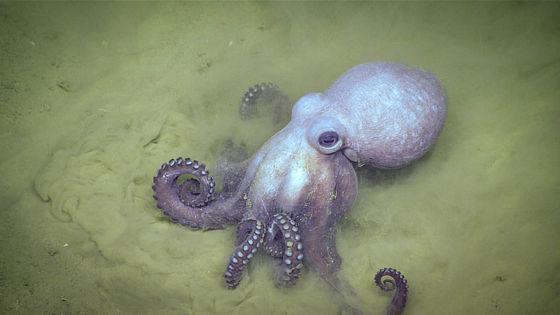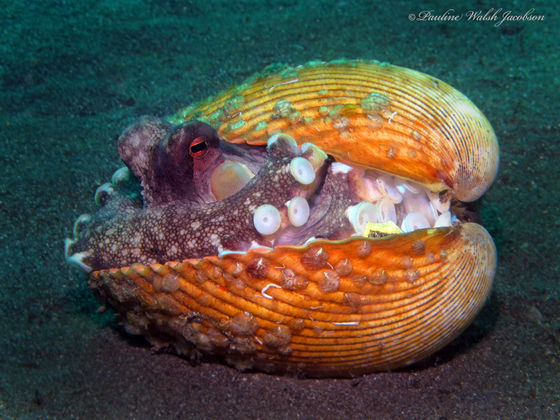Octopuses will build civilization on Earth after the extinction of humanity

With the risk of nuclear war rising and climate change worsening, the extinction of human civilization becoming a real threat, with some scientists claiming that
If Humans Die Out, Octopuses Already Have the Chops to Build the Next Civilization, Scientist Claims
https://www.popularmechanics.com/science/animals/a63184424/octopus-civilization/
'Our unlikely successors may lie in the sushi ingredients we eat,' says Tim Coulson, an evolutionary biologist at the University of Oxford in the UK.
While modern humans are only Homo sapiens, there are many different species of octopus that live in a variety of places, from the deep sea to the seashore.
So, Coulson said, 'if one population or species doesn't do well, other species have a chance to survive, expand their range, diverge in evolutionary terms and colonize different habitats, including coastal areas.'

by
It may be hard to imagine such a thing happening, but marine life has evolved in the past to adapt to the extinction of terrestrial life, and humans are descended from mammals that emerged after the extinction of the dinosaurs.
'Just as small mammal ancestors paved the way for humans after the dinosaurs went extinct, there are plenty of scenarios in which other currently secluded species could become masters of a post-human world,' said Andrew Whiten, a zoologist at the University of St Andrews in Scotland.
Octopuses are highly intelligent animals, and several species have been known to use tools in the wild, such as the coconut octopus , which carries around clams and coconut shells to use as shelter.

By Pauline Walsh Jacobson
In captivity, octopuses have been observed using tools to solve puzzles and learning to open jars to access the food inside.
Octopuses are clever enough to outwit humans at times, such as by escaping from an aquarium and returning to the sea , but they have acquired their intelligence in a different way from humans, who have developed large brains.
'Octopuses appear to have a highly evolved nervous system, but the collection of neurons connecting their eight legs and huge eyes is more like a giant data processing center than a brain,' says Andy Dobson, an evolutionary biologist at Princeton University in the United States. 'The intelligence of octopuses comes from their eight legs and two large eyes that sense their environment.'
Previously published research has shown that octopus legs form a network that can operate semi-autonomously and independently, while also working together to complete a task.
Research results show that the eight legs of an octopus are a 'distributed network with independent CPUs' - GIGAZINE

by OIST
Octopuses don't have spines like humans, so Coulson believes they're more likely to build civilizations underwater than on land. If that's the case, octopuses would first need access to a cheap energy source to develop underwater cities, which could mean using the tides for coastal octopuses, or hydrothermal vents for deep-sea octopuses, which is a bit more difficult.
The next challenge for octopuses, who have acquired intelligence and energy, is to become social. Octopuses do not generally live in groups and sometimes even engage in cannibalism, so this must be overcome in order for them to live in groups.
'Octopuses' nature makes them less suited to building human-like societies, which means they're less likely to develop culture,' said Peter Godfrey-Smith, professor of history and philosophy of science at the University of Sydney in Australia. 'Culture, in this case, is the ability to learn from other individuals in a society. So the challenge for octopuses is to become social beings and then to change the way they raise their young.'
Godfrey-Smith points out that not only do adult octopuses not learn from each other, but there is also little cultural transfer between generations of octopuses, so stronger parent-offspring bonds may be necessary for octopuses to develop more intimate societies.
Dobson believes that octopus social habits have changed very little over the past 50 to 100 million years and are unlikely to change in the near future, but as octopus research continues, it's becoming clear that some species are highly social, possibly living in groups of 10 or more.
Octopuses build small 'towns' and live socially in groups - GIGAZINE

There is a huge variety of octopus species on Earth, so it is possible that some species will eventually develop advanced social lives.
Dobson says that if octopuses fail to dominate the planet, nematodes could be the unlikely dark horse to emerge as the winner of the sixth mass extinction. Godfrey-Smith, on the other hand, is pinning his hopes on parrots.
Related Posts:







